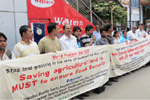Published on Thu, 2012-10-25 11:41
The World Social Forum 2013 (WSF 2013) will take place in Tunis from the 26th to the 30th March. Its website was launched on 15th October, and that kicked off the registration process for organizations and for proposals of activities. In the Tunisian Secretariat members of the WSF 2013 are listed the two focal point of Social Watch in that country: the Tunisian League for Human Rights (LTDH) and the Tunisian Association of Democratic Women (ATFD). |
Published on Thu, 2012-10-25 10:40
Participation of relevant stakeholders, including communities at grassroots levels, will help ensure good management of natural resources in African nations, for economic growth and benefit of citizens, according to participants at the Coalition for Dialogue on Africa (CoDA), among them the coordinator of Third World Network-Africa (TWN-A), Yao Graham. The conference was held this week in Addis Ababa, ahead of the 8th African Development Forum (ADF VII). |
Published on Thu, 2012-10-25 10:39
Seventeen civil society organization headed by EquityBD along with the South Asia Alliance for Poverty Eradication (SAAPE) carried out a human chain in Dhaka observing 16th October as World Food Less Day, the same date the United Nations proclaims as the World Food Day, to raise the voice on behalf the hungry people. |
Published on Thu, 2012-10-25 10:37
Reforming the Interior Ministry is not one of Egyptian president Mohamed Morsy's priorities, which allows police to continue attacking citizens with excessive force, according to 24 Egyptian human rights organizations, among them the Arab Penal Reform Organization, the Human Rights Association for the Assistance of the Prisoners, and the Egyptian Association for Community Participation Enhancement (national focal point of Social Watch). |
Published on Wed, 2012-10-24 13:02
Affiliates of South Korea's top 10 conglomerates still prefer former government officials and ex-policymakers as outside directors, reported Yonhap news agency. The Citizens' Coalition for Economic Justice (CCEJ, national focal point of Social Watch), says that "enhancing independence will reduce the chance of these posts being used for lobbying since companies will not be as able to influence outside directors as they could in the past." A total of 330 people served as outside directors at the 93 affiliates of the leading conglomerates as of end-June this year, down from 337 a year earlier, according to the data compiled by local research firm Chaebol.com. |
SUSCRIBE TO OUR NEWSLETTER







